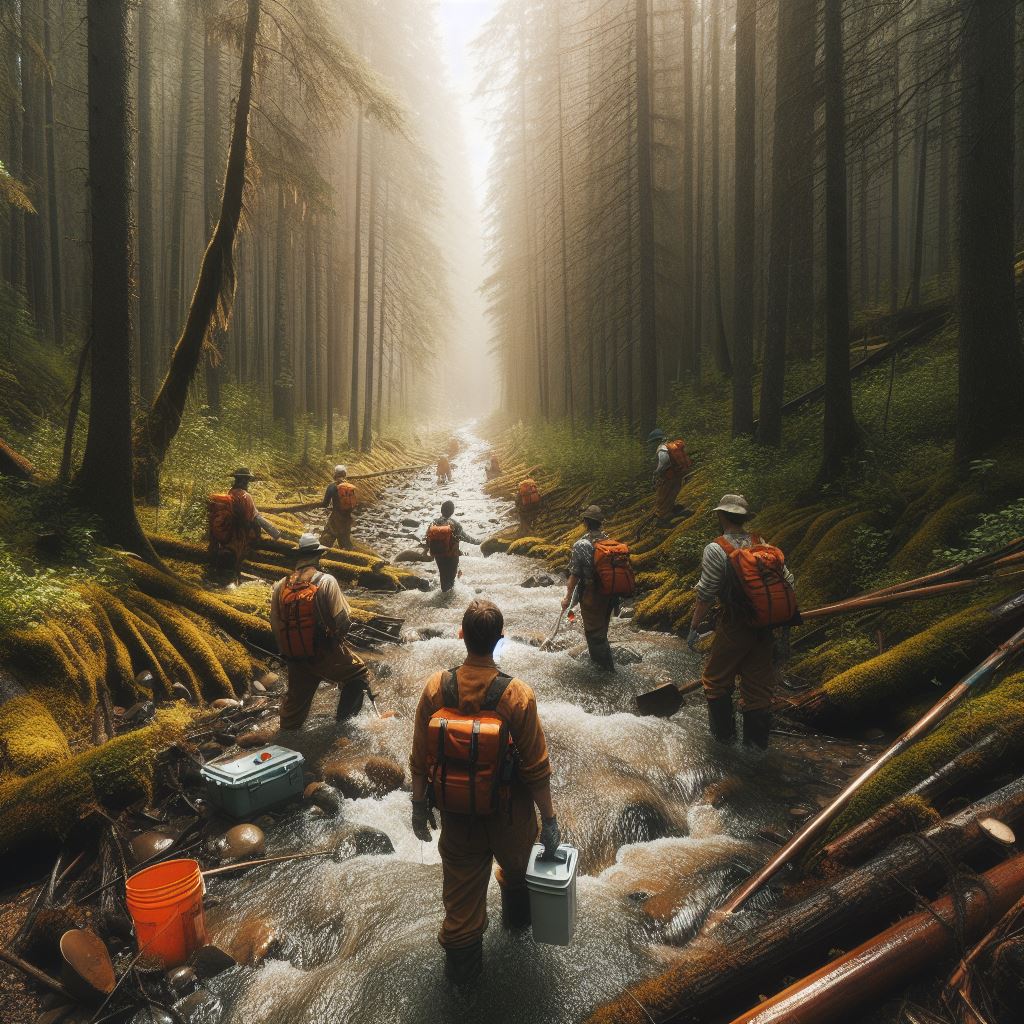Introduction
In the vibrant world of Canadian environmental science, fieldwork tales resonate with intriguing narratives.
Fieldwork Tales of Canadian Environmental Scientists provide captivating narratives of researchers navigating the country’s diverse ecosystems.
From the Arctic tundra to coastal rainforests, these stories chronicle the challenges and discoveries encountered during hands-on scientific exploration.
Researchers share experiences of wildlife encounters, extreme weather conditions, and the intricate dance between human activities and the environment.
These tales offer insights into the complexities of ecological research, highlighting the dedication and resilience required to unravel the mysteries of Canada’s diverse landscapes.
The narratives not only capture the scientific essence but also convey the profound connection between scientists and the ecosystems they study.
Engaging in fieldwork is pivotal as it facilitates real-world observation and data collection.
Fieldwork is integral to environmental science as it provides hands-on experiences crucial for understanding ecosystems, collecting data, and assessing environmental issues.
It allows scientists to directly observe natural processes, gather real-time data, and identify patterns or anomalies.
Fieldwork enhances problem-solving skills, fosters a deeper connection to the environment, and promotes a holistic understanding of ecological systems.
By conducting on-site investigations, researchers can validate laboratory findings, ensuring the applicability and accuracy of their studies.
Additionally, fieldwork facilitates collaboration with local communities, promoting a more inclusive and comprehensive approach to addressing environmental challenges.
The purpose of this blog post is to unveil captivating and inspiring fieldwork stories.
Read: A Day in the Life of a Canadian Data Scientist
Fieldwork Story 1: A Glimpse into the Life of Environmental Scientist
Meet Dr. Emily Thompson, a passionate Canadian environmental scientist dedicated to understanding ecosystem dynamics and conserving biodiversity.
Unlock Your Career Potential
Visualize a clear path to success with our tailored Career Consulting service. Personalized insights in just 1-3 days.
Get StartedIn her most recent fieldwork, Dr. Thompson embarked on an expedition to study the impacts of climate change on Arctic tundra vegetation.
Undertaking this project was no easy feat, as the challenging conditions of the Arctic presented numerous hurdles.
Battling freezing temperatures and strong winds, Dr. Thompson and her team struggled to set up their research equipment.
Moreover, the remote location made it difficult to transport supplies and communicate with their base camp.
Despite these challenges, the team persevered and collected valuable data on changes in plant species distribution.
One remarkable finding was the migration of certain plant species towards higher altitudes, driven by the warming climate.
Another surprising discovery was the decrease in overall plant diversity, indicating potential ecosystem instability.
Reflecting on her experience, Dr. Thompson realized the importance of adapting research methods to extreme environments.
She emphasized the value of building strong team dynamics and maintaining a positive mindset to overcome obstacles.
Additionally, Dr. Thompson learned the significance of patience and resilience in the face of unpredictable field conditions.
Fieldwork has undoubtedly molded Dr. Thompson into a more adaptable and tenacious scientist.
From this expedition, she discovered the complexity of climate change impacts on delicate Arctic ecosystems.
Through her findings, Dr. Thompson aims to raise awareness regarding the urgent need for conservation measures.
She hopes that policymakers and communities will take action to protect these vulnerable and critical ecosystems.
Land Your Dream Canadian Job with a Perfect Resume
Unlock opportunities by tailoring your resume for Canadian employers. ATS-optimized and aligned with industry standards, this service boosts your chances of getting noticed and hired.
Start NowTruly, Dr. Thompson’s fieldwork reveals the indomitable spirit of Canadian environmental scientists.
They brave harsh conditions, overcome challenges, and acquire invaluable insights into our ever-changing world.
Read: Day in the Life of a Canadian Biologist: An Overview
Delve into the Subject: The Role of AI in Environmental Science Today
Fieldwork Story 2: Exploring the Depths
In this section, we introduce Dr. Emily Thompson, a marine biologist specializing in deep-sea exploration.
Dr. Thompson’s latest fieldwork experience took her to the uncharted depths of the Pacific Ocean.
During her research project, she embarked on a mission to study the mysterious creatures living in the Mariana Trench.
As Dr. Thompson descended in a state-of-the-art submersible, she faced numerous challenges.
The extreme pressure and darkness at those depths made it difficult to conduct experiments and collect samples.
To overcome these obstacles, Dr. Thompson and her team designed specialized equipment that could withstand the immense pressure.
They also developed high-resolution cameras and lights to document the deep-sea ecosystem in detail.
Unconventional or extraordinary situations that occurred during the research
One extraordinary situation occurred when their submersible encountered a giant squid.
It was a rare sighting, and Dr. Thompson quickly adjusted her research plans to observe and collect data on this elusive creature.
Despite the initial difficulties, the team managed to capture incredible footage and gather valuable information about the squid’s behavior.
Elevate Your LinkedIn Profile for Canadian Success
Attract top Canadian recruiters by optimizing your LinkedIn profile. Boost your visibility with compelling keywords, a standout summary, and a professional presence that makes you unforgettable.
Get StartedThroughout the expedition, Dr. Thompson and her team experienced the wonders and challenges of exploring the unknown.
They discovered new species, unraveled the complex food web, and studied the effects of extreme conditions on marine life.
Dr. Thompson’s findings highlighted the importance of preserving these delicate ecosystems and sparked further research in deep-sea conservation.
Her contributions to the field of marine biology continue to inspire future generations of scientists and conservationists.
From her fieldwork, Dr. Thompson reinforced the need for international collaboration to protect and understand our planet’s most remote and fragile environments.
Her efforts shed light on the fascinating world beneath the surface and provided crucial knowledge for safeguarding our oceans.
In fact, Dr. Emily Thompson’s fearless exploration of the deep sea brought invaluable insights into the mysteries of the ocean.
Her dedication, ingenuity, and perseverance serve as a shining example for aspiring environmental scientists worldwide.
Read: Top Canadian Universities for Data Science

You Might Also Like: Canadian Research Analysts: Industry Outlook 2024
Fieldwork Story 3: Dr. Emily Chen and the Hidden Secrets of Coral Reefs
Meet Dr. Emily Chen, a brilliant environmental scientist specializing in marine ecology. Her passion lies in exploring the mysteries of coral reefs and understanding their delicate ecosystems.
During one of her exciting fieldwork episodes, Dr. Chen embarked on a journey to an isolated island in the Pacific Ocean.
Her goal was to conduct an ecological study on the effects of rising sea temperatures on coral bleaching.
As she stepped foot onto the island, Dr. Chen immediately encountered the unique environmental challenges she had anticipated.
The intense heat, unpredictable weather, and limited resources tested her resilience and determination.
Undeterred, she set up her research station and began monitoring the coral reefs day and night. With her team, Dr. Chen collected data on water temperatures, salinity levels, and the health of corals across various locations.
Groundbreaking discoveries made by the scientist
During her study, Dr. Chen made a surprising and groundbreaking discovery. She observed that certain coral species exhibited higher resilience to rising temperatures than previously thought.
This finding challenged conventional beliefs and offered new hope for the survival of coral reefs in a warming world.
The impact of Dr. Chen’s research extended beyond the scientific community.
Her findings prompted policymakers to reevaluate conservation strategies and take into account the resilient coral species she had identified.
This led to the implementation of stricter regulations and increased efforts to protect these unique ecosystems.
As her fieldwork came to a close, Dr. Chen reflected on her journey. She knew that her work had the potential to shape future policies and contribute to the preservation of coral reefs worldwide.
Dr. Chen’s dedication and groundbreaking discoveries made her a respected figure in the field of marine ecology.
Her impact on both scientific research and policy-making cannot be overstated.
Through her relentless pursuit of knowledge, she is helping us understand the intricate beauty and fragility of coral reefs and paving the way for their protection.
In general, Dr. Emily Chen’s fieldwork episode serves as a testament to the incredible work carried out by environmental scientists.
Their curiosity, perseverance, and unwavering commitment to their respective fields have the power to make a lasting impact on our planet and its valuable ecosystems.
Read: Data Science in Canada: Skills You Need
Conclusion
The three fieldwork stories shared by Canadian environmental scientists highlight several key points and common themes.
The tales showcase the diverse and complex nature of environmental science research.
Through their experiences, we learn that fieldwork is not only an essential part of scientific knowledge but also plays a crucial role in conservation efforts.
These stories shed light on the challenges and rewards that come with conducting research in the field.
The significance of these tales lies in their ability to demonstrate the real-world applications of environmental science.
They showcase how scientists can directly contribute to the understanding and protection of our environment.
Fieldwork has broader implications for environmental scientists. It allows them to gather firsthand data, make observations, and establish a connection with the natural world.
This hands-on approach contributes to the advancement of scientific knowledge in a unique and meaningful way.
Furthermore, these fieldwork stories serve as a reminder of the importance of appreciating the work of Canadian environmental scientists.
Their contributions to studying and protecting the environment are invaluable. We should recognize and support their efforts in safeguarding our natural resources and ecosystems.
The fieldwork tales shared by Canadian environmental scientists not only provide insights into their research endeavors but also inspire us to value and protect our environment.
Let us celebrate the work of these dedicated scientists and their ongoing commitment to preserving the natural world for future generations.




